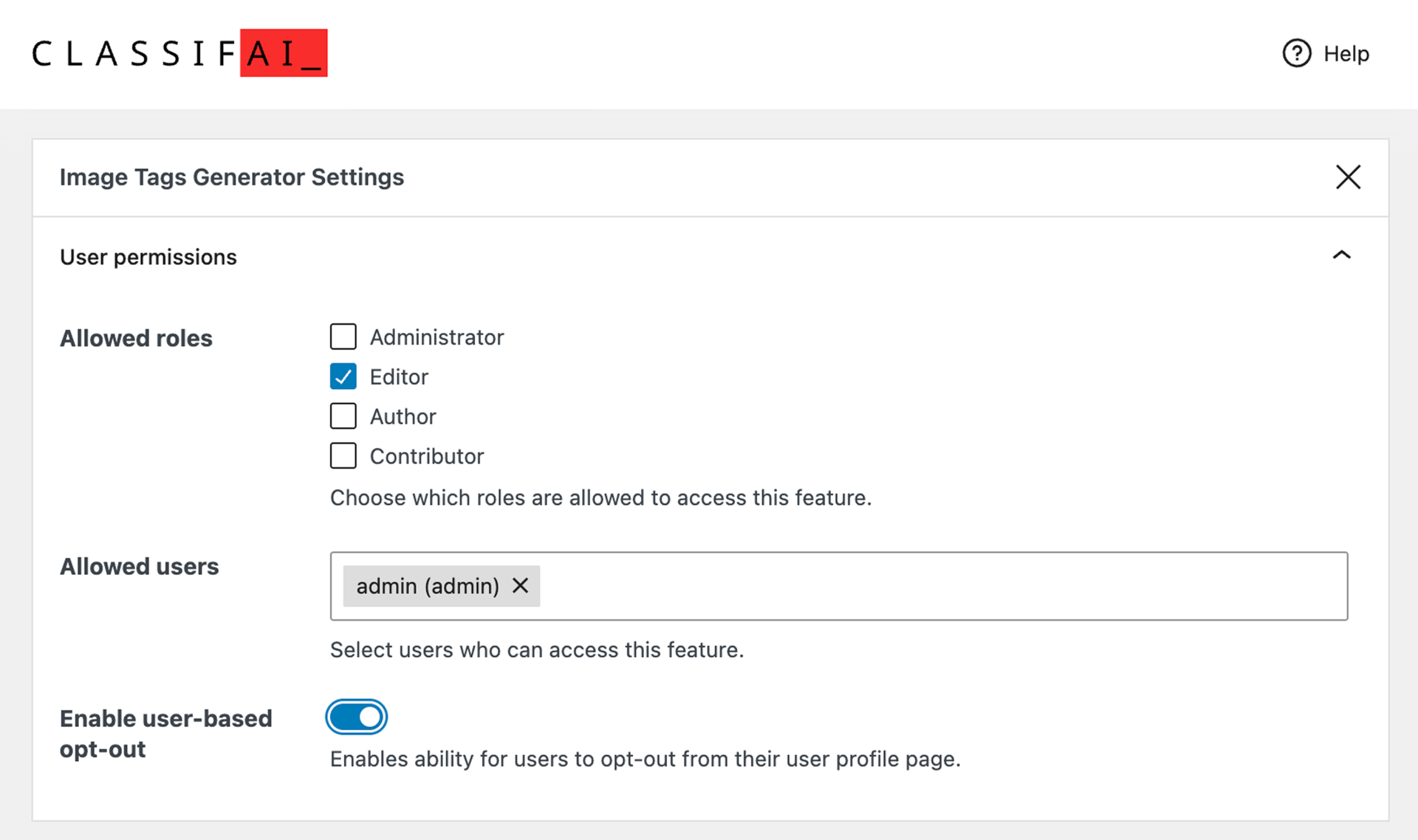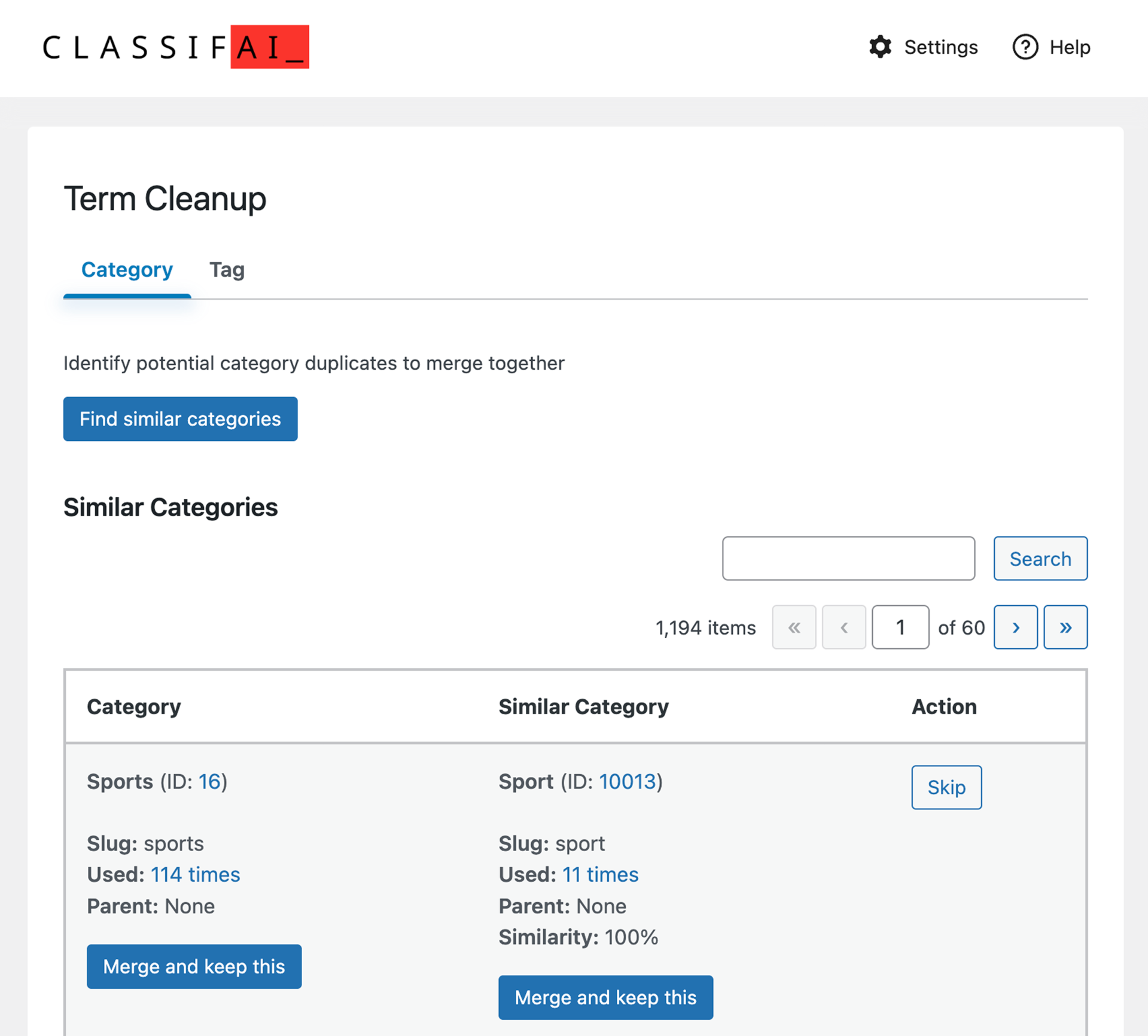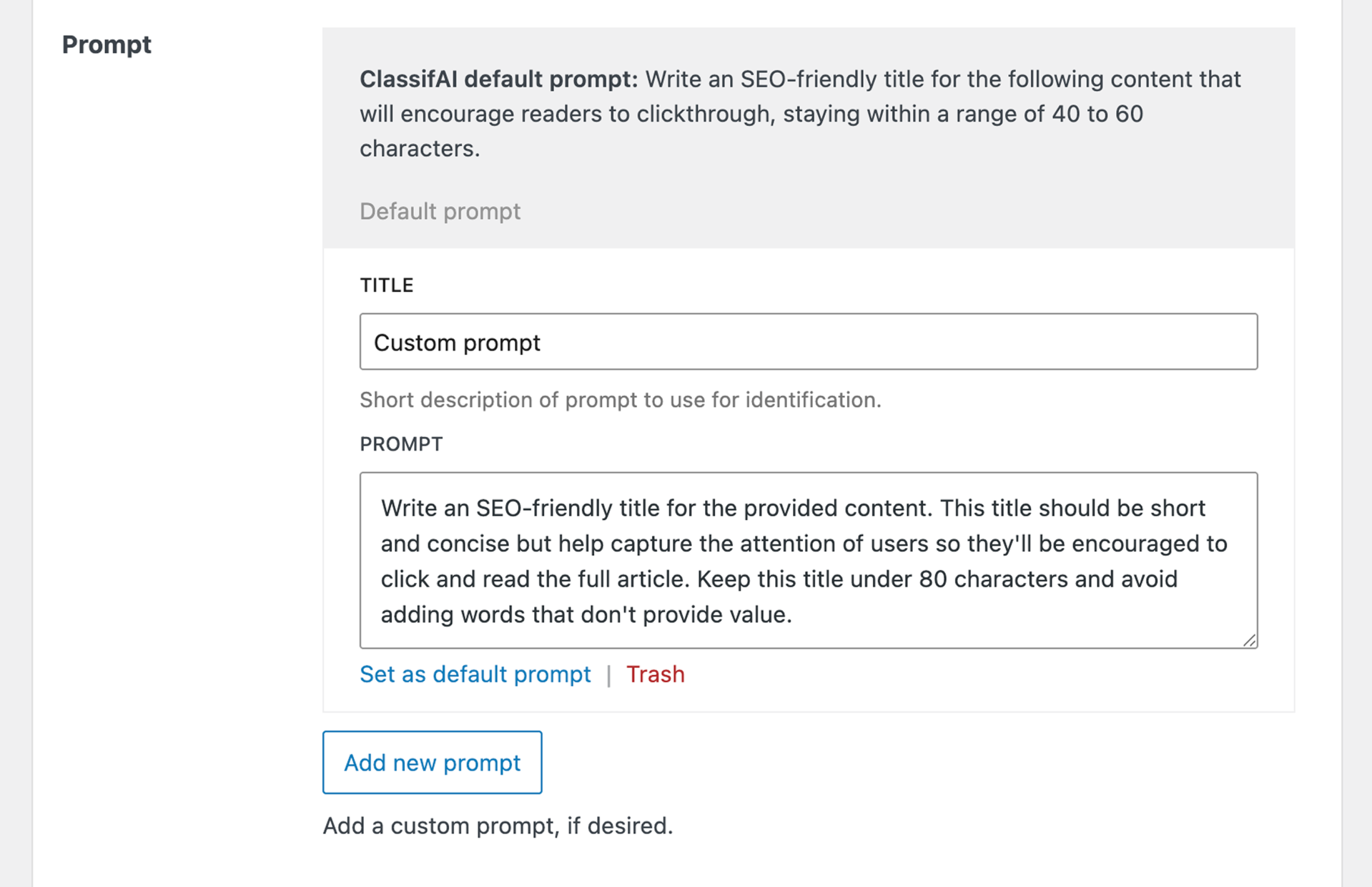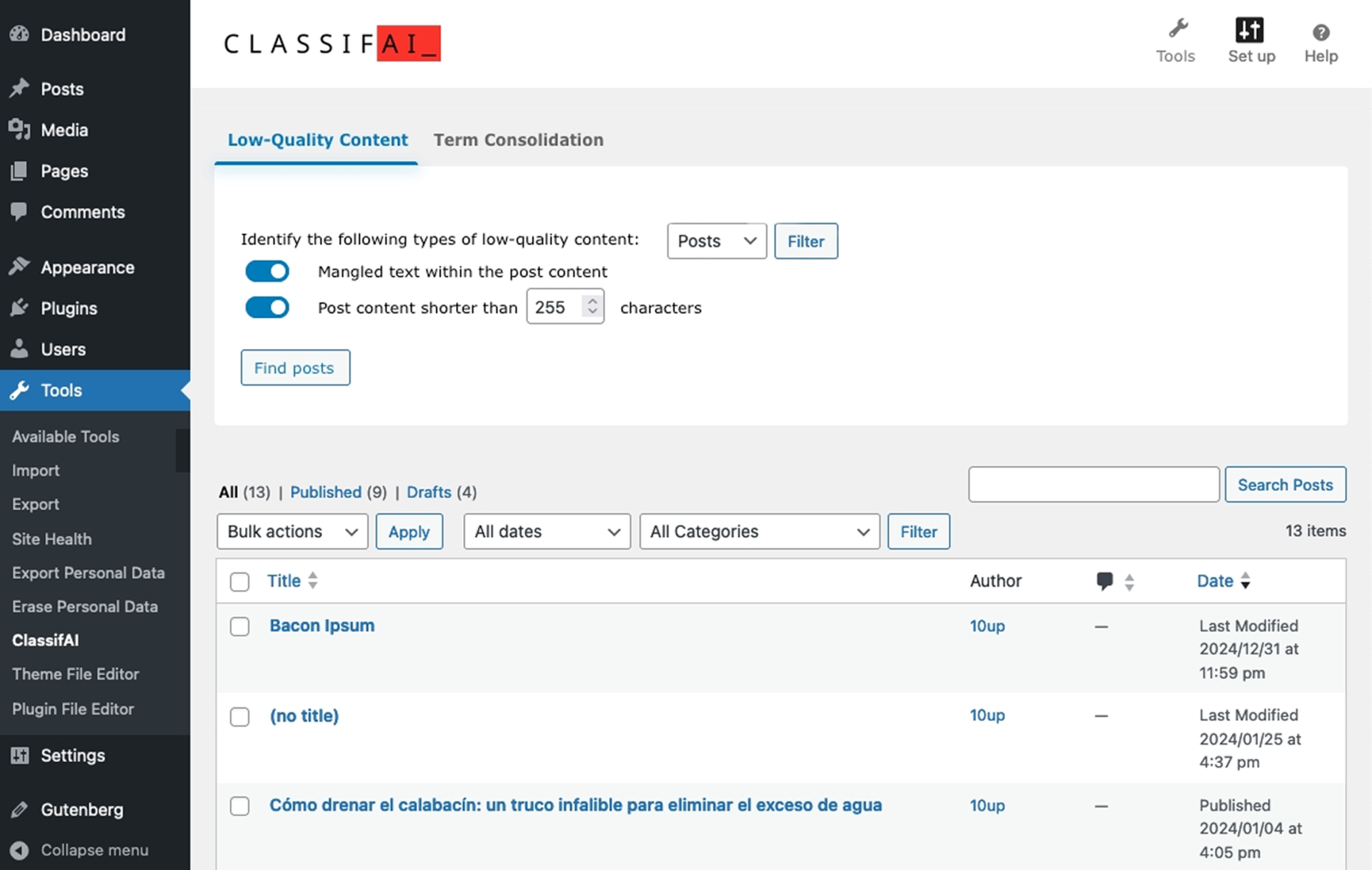Penske Media Corporation (PMC), home to influential media brands like Rolling Stone, Variety, and Vibe, has always prioritized staying ahead in the competitive digital publishing landscape. In mid-2023, recognizing the profound potential of Generative Artificial Intelligence (AI) to transform content workflows, enhance audience engagement, and streamline editorial operations, PMC partnered with 10up, a leading digital agency deeply experienced with WordPress at scale, now the WordPress practice of Fueled.
With a vision to rapidly prototype and ship AI-powered enhancements on a limited exploratory budget, PMC decided to collaborate with 10up after learning about and experimenting with ClassifAI—10up’s powerful, open-source AI integration toolkit for WordPress.
ClassifAI as the Foundation
ClassifAI is an advanced, flexible WordPress plugin designed to help enterprises and publishers seamlessly integrate powerful AI capabilities directly into WordPress. It offers a comprehensive suite of features including smart content tagging, automated image descriptions and tagging, sophisticated content recommendations, and advanced integrations with popular AI models like OpenAI’s ChatGPT, Google’s Gemini, and many others. ClassifAI enables editorial and content teams to enhance productivity, streamline complex workflows, improve SEO, and drive visitor engagement.

10up has been at the forefront of integrating AI into online content workflows since the earlier days of machine learning, with active research and early builds of ClassifAI dating back to 2018. Already seeing adoption in enterprise publishing environments—particularly across WordPress VIP customers—ClassifAI stands out in the enterprise due to its transparent, agnostic approach to the external AI providers and models that power its features. This flexibility ensures organizations have control and a clear understanding as to how their content and data is used, and offers multiple provider choices, making ClassifAI uniquely suited for enterprises demanding both performance and strategic autonomy.
A Deeply Collaborative Engagement
The partnership between PMC and 10up was characterized by its deeply collaborative, iterative, and experimental approach. Engineers and product owners from both teams worked hand-in-hand, rapidly prototyping features, testing ideas, and directly engaging with editorial teams to gather continuous feedback on real-world usability and effectiveness. This highly interactive collaboration allowed PMC’s teams to iteratively refine their AI strategies and tools, ensuring solutions were genuinely valuable and immediately applicable.
The engagement blended open contributions and enhancements to ClassifAI with strategically private innovations. While many enhancements were openly integrated into ClassifAI’s core, certain strategic experiments and developments remained proprietary. This balanced approach enabled PMC to meaningfully differentiate themselves and strengthen their competitive positioning within the highly competitive digital media ecosystem, while also contributing to the success of WordPress as a platform. 10up extended meaningful rate discounts for all work that went back into its open ClassifAI project.ReR
“Working with 10up on their ClassifAI plugin has been a great experience. Their plugin allowed our team to explore AI solutions quickly and in a cost-effective manner. We appreciated the collaborative process with 10up’s engineers, which helped us understand how to integrate AI more effectively into our publishing workflow. This partnership has been crucial in helping us better understand and utilize generative AI.”
— Gabriel Koen, SVP of Technology at PMC
Building on Strategic Foundations with Azure OpenAI
A foundational advantage of ClassifAI that made it particularly attractive to PMC was its transparent, service-agnostic architecture. Unlike other AI tools that can be opaque or inflexible, ClassifAI afforded PMC full control over which AI providers and models they chose to integrate with. This enabled PMC to immediately leverage their existing enterprise agreement with Microsoft Azure to integrate with Azure’s OpenAI services, dramatically simplifying internal compliance and contract processes. This strategic choice significantly accelerated the pace of innovation and implementation, and engendered trust across PMC leadership.
Moreover, ClassifAI’s flexibility ensures PMC retains the ability to seamlessly switch AI providers or even integrate their own proprietary models in the future, reinforcing strategic agility and independence.
Granular Permissions & Staged Feature Rollouts
A core insight from early planning was that one of the biggest challenges to successfully adopting AI tools at scale wasn’t technical—it was organizational. With multiple publications and a wide range of editorial teams, PMC needed a way to gradually introduce AI tools for content production, giving teams time to build trust in them and adopt them organically. As a result, work was prioritized on a granular permissioning and role-based controls within ClassifAI.
These enhancements allowed PMC to selectively enable specific AI features by user role, individual user, or publication. For example, features like title suggestions or text expansion and contraction could be turned on only for senior editors or more technologically progressive writers at one brand, while remaining hidden from others until proven valuable. In parallel, as features became available to each editorial user, they could opt in or out of certain features themselves.

This approach enabled real-world testing in low-friction environments, reduced resistance to change by starting with early champions, and supported more thoughtful, feedback-driven rollouts. It also reinforced ClassifAI’s alignment with real editorial operations—treating AI tools not as one-size-fits-all automation, but as nuanced enhancements designed to serve and support the editorial craft.
Smart 404 Pages: Transforming a Frustration into Engagement
PMC and 10up identified an opportunity to significantly improve user experience and SEO performance on error pages—specifically, the ubiquitous but typically neglected 404 pages. Recognizing that traditional 404 pages frequently provided poor user experiences and were a top source of “bounced” visitors, PMC envisioned a smarter, more contextual approach. Leveraging ClassifAI, the teams implemented a solution using OpenAI’s semantic embeddings technology:
- Every published article’s URL slug, title, and story content is converted into semantic embeddings and stored.
- When users encounter a 404 error, the URL slug they attempted to access is dynamically analyzed and matched against stored embeddings.
- Visitors are presented with a highly relevant, automated set of suggested articles, dramatically enhancing user experience and increasing on-site engagement.

Behind the scenes, the teams considered and tested optimized storage solutions, including vector databases, ensuring that this powerful recommendation system performed rapidly and reliably at PMC’s enterprise scale and the WordPress VIP platform.
In live production environments, PMC has already seen real world impact, with a 15% drop in bounce rate, reflecting more effective user retention.
Advanced Tag and Category Management with AI
PMC’s digital publications manage extensive taxonomies—Rolling Stone alone had over 21,000 tags at the time of this project. To address this complexity, PMC and 10up expanded ClassifAI’s capabilities to include intelligent taxonomy consolidation powered by AI. Using OpenAI embeddings to analyze semantic relationships between tags and categories, the new “Term Cleanup” feature identifies redundant or closely related terms, recommending intuitive consolidations.

To ensure terms remained consistent and consolidated going forward, a new variation of the category and tag recommendation feature was rolled out using the same OpenAI Embeddings, limiting recommendations to only to existing terms.
10up also improved the UI for category and tag suggestions, based on consistent feedback from PMC’s editorial and product teams. These improvements included new workflows for reviewing AI-generated tag and category recommendations (rather than adding them automatically), and more clearly distinguishing AI-suggested terms from those manually added by human editors. This increased the usability of existing term suggestion features, which can improve a site’s SEO through more coherent and efficient taxonomy pages.
Granular Prompt Customization inside WordPress
Another key feature developed through the collaboration was granular prompt customization within the WordPress interface. This provided site administrators and editorial teams configuring ClassifAI the ability to add context-specific instructions for the AI when making specific types of requests.
For instance, when generating SEO-optimized title recommendations, administrators could tailor the AI prompt specifically for any magazine or publication. A practical example might include instructions such as, “let’s keep these titles short and a bit witty” or “we prefer clarity and heavy use of common keywords”, directly influencing the AI-generated output.

This level of prompt customization enables precise, publication-specific tailoring of AI interactions, allowing editorial teams to experiment and refine outcomes without technical intervention, and empowering editors to confidently integrate AI-driven suggestions into their workflows.
Developer-Friendly Customization
An early focus of this engagement involved enhancing ClassifAI’s underlying architecture to empower sophisticated internal engineering teams like those at PMC. 10up’s engineers dramatically expanded ClassifAI’s hooks and filters, providing PMC’s developers with virtually unlimited control over AI input, processing, and output at a code level. This allowed PMC to tailor AI logic precisely to their unique publishing workflows and requirements, fostering ongoing innovation and iterative enhancements, and allowing rapid prototyping of features like prompt customization while UI work was in progress.
A Forward-Looking Roadmap
PMC and 10up’s collaboration also included joint exploration and ideation on future enterprise AI applications and ClassifAI’s roadmap, identifying several high-value opportunities.
Advanced media library enhancements. ClassifAI’s smart image tagging, automatic descriptions, and OCR capabilities already significantly enrich the WordPress media library’s searchability. However, shared research conducted in early 2024 identified further potential improvements, such as smart image recommendations leveraging existing AI-generated data, enhanced search and filtering capabilities, and addressing gaps in existing vision AI platforms—particularly in accurately recognizing industry-specific individuals beyond mainstream celebrities. These enhancements aim to bridge the gap between basic WordPress media management and specialized Digital Asset Management (DAM) solutions.
AI-powered social media automation. Integration opportunities with platforms like Jetpack and Autopost for X, leveraging analytics to generate impactful social media content, and enhancing content promotion. Challenges include managing more complex scheduling and automation, without trying to turn ClassifAI into a full fledged social media management tool.
Content quality management. AI-driven identification and optimization of low-quality or outdated content to enhance overall SEO performance and audience engagement, including automated recommendations for merging or purging underperforming content.

Lasting Impact and Enterprise Momentum
The partnership has already proven impactful at PMC, with features like Smart 404 pages actively driving improved user engagement. The collaboration’s iterative and experimental approach, leveraging rapid prototyping and close engineering-editorial collaboration, has equipped PMC with additional knowledge and confidence to continue evolving their publishing operations independently.
Across the industry, ClassifAI continues gaining momentum among major enterprises, especially within the WordPress VIP ecosystem where ClassifAI is optimized for compatibility with VIP infrastructure like Elasticsearch. ClassifAI sees hundreds of direct downloads monthly, reflecting broad and growing market adoption across its target business and enterprise market.



